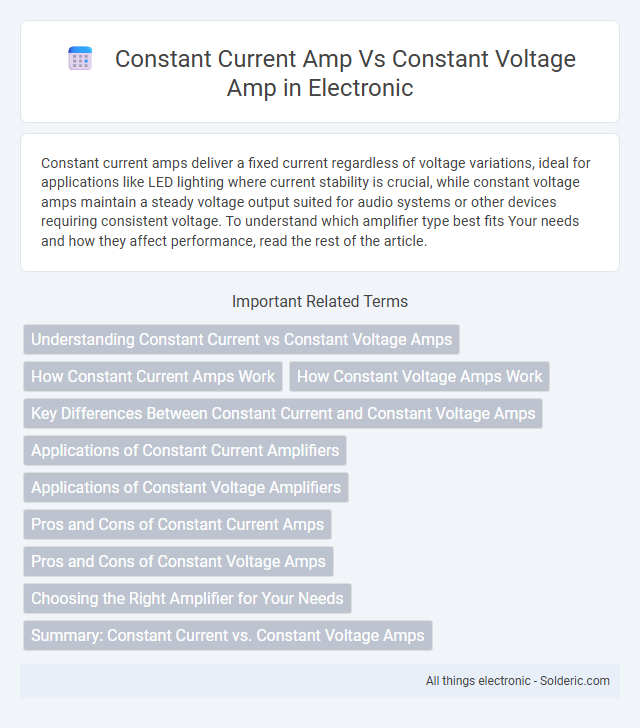Constant current amps deliver a fixed current regardless of voltage variations, ideal for applications like LED lighting where current stability is crucial, while constant voltage amps maintain a steady voltage output suited for audio systems or other devices requiring consistent voltage. To understand which amplifier type best fits Your needs and how they affect performance, read the rest of the article.
Comparison Table
| Feature | Constant Current Amplifier | Constant Voltage Amplifier |
|---|---|---|
| Function | Maintains a fixed current output regardless of load | Maintains a fixed voltage output regardless of load |
| Application | LED driving, battery charging, biomedical devices | Audio amplifiers, power supplies, signal processing |
| Load Dependency | Voltage varies with load changes | Current varies with load changes |
| Output Control | Controls current precisely | Controls voltage precisely |
| Typical Usage | Devices requiring stable current for performance | Devices requiring consistent voltage for operation |
| Advantages | Prevents current overload, protects sensitive components | Delivers stable voltage, ensures signal integrity |
| Disadvantages | Voltage fluctuations may affect device behavior | Current fluctuations may affect power delivery |
Understanding Constant Current vs Constant Voltage Amps
Constant current amps maintain a fixed current output regardless of load changes, making them ideal for applications requiring stable current flow such as LED drivers and battery charging. Constant voltage amps provide a steady voltage output, ensuring devices like audio amplifiers and power supplies receive consistent voltage despite varying load conditions. Understanding the difference helps you select the appropriate amplifier for precise control in your electronic circuits.
How Constant Current Amps Work
Constant current amplifiers maintain a fixed current output regardless of load impedance changes, ensuring stable current flow to devices like LEDs or electroplating systems. These amps adjust voltage dynamically to keep current steady, preventing damage from overcurrent situations. You benefit from precise current control when using constant current amps in applications sensitive to current fluctuations.
How Constant Voltage Amps Work
Constant voltage amps deliver a fixed voltage level to speakers, typically 70V or 100V systems, allowing multiple speakers to be driven over long distances without significant power loss. Your audio setup benefits from these amps by simplifying wiring and ensuring consistent sound levels across distributed speakers in commercial or large-scale public address systems. This method relies on transformers to step down the voltage at each speaker, maintaining clarity and reducing impedance issues common in constant current designs.
Key Differences Between Constant Current and Constant Voltage Amps
Constant current amplifiers regulate output current to remain constant despite load variations, making them ideal for driving LEDs and other current-sensitive devices. Constant voltage amplifiers maintain a fixed output voltage regardless of load changes, commonly used in audio and power supply applications. The primary difference lies in their control strategy: constant current amps control current precisely, while constant voltage amps prioritize voltage stability.
Applications of Constant Current Amplifiers
Constant current amplifiers are predominantly used in applications requiring precise control of current regardless of load variations, such as driving LEDs, photodiodes, and sensors in optical and biomedical instrumentation. Their ability to maintain a steady current makes them ideal for electroplating, battery charging, and driving laser diodes where voltage fluctuations must be minimized to ensure device longevity and performance. Compared to constant voltage amplifiers, constant current amplifiers enhance accuracy and reliability in systems that depend on stable current delivery.
Applications of Constant Voltage Amplifiers
Constant voltage amplifiers are essential in audio distribution systems where maintaining a uniform voltage across multiple speakers ensures consistent sound quality over long distances. These amplifiers are widely used in public address systems, commercial buildings, and outdoor sound systems to drive many speakers without signal degradation. Your installation benefits from their ability to deliver stable voltage, enabling efficient power distribution and simplified wiring setups.
Pros and Cons of Constant Current Amps
Constant current amplifiers provide consistent current output regardless of load variations, making them ideal for driving devices like LEDs or laser diodes that require stable current to prevent damage. They offer improved protection and precise control but can be more complex and expensive compared to constant voltage amplifiers. Your choice should consider whether maintaining a steady current is crucial for your application to ensure optimal performance and longevity.
Pros and Cons of Constant Voltage Amps
Constant voltage amplifiers provide a stable voltage output ideal for driving speakers over long cable runs, minimizing power loss and impedance variation issues. They excel in public address systems and commercial audio installations where consistent sound levels across multiple speakers are crucial. However, constant voltage amps may deliver less precise control over speaker current, potentially reducing audio fidelity compared to constant current amplifiers designed for more dynamic and high-performance audio environments.
Choosing the Right Amplifier for Your Needs
Choosing between a constant current amplifier and a constant voltage amplifier depends on the specific application and load characteristics. Constant voltage amplifiers excel in driving speakers and resistive loads due to stable voltage output, while constant current amplifiers are ideal for inductive or variable loads requiring precise current control. Understanding the impedance and power requirements ensures optimal performance and prevents damage to connected devices.
Summary: Constant Current vs. Constant Voltage Amps
Constant current amplifiers maintain a stable current output regardless of load variations, making them ideal for driving LEDs or specialized circuits requiring precise current control. Constant voltage amplifiers deliver a steady voltage output, preferred for typical audio applications where speaker impedance changes but voltage consistency is crucial. Your choice depends on whether your device prioritizes current regulation or voltage stability for optimal performance.
constant current amp vs constant voltage amp Infographic

 solderic.com
solderic.com